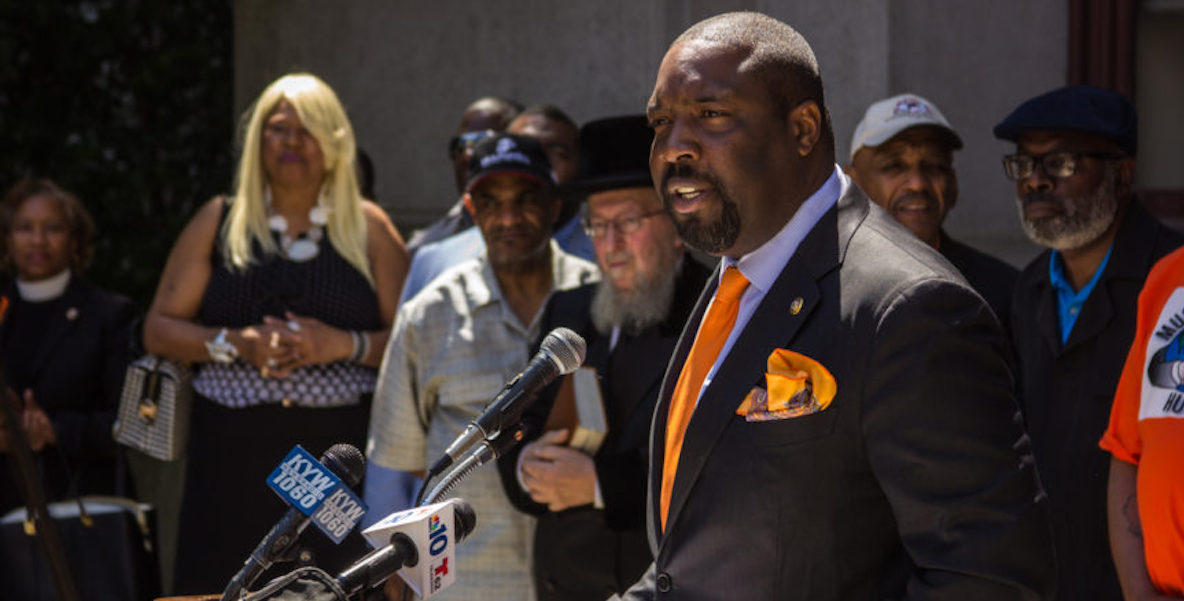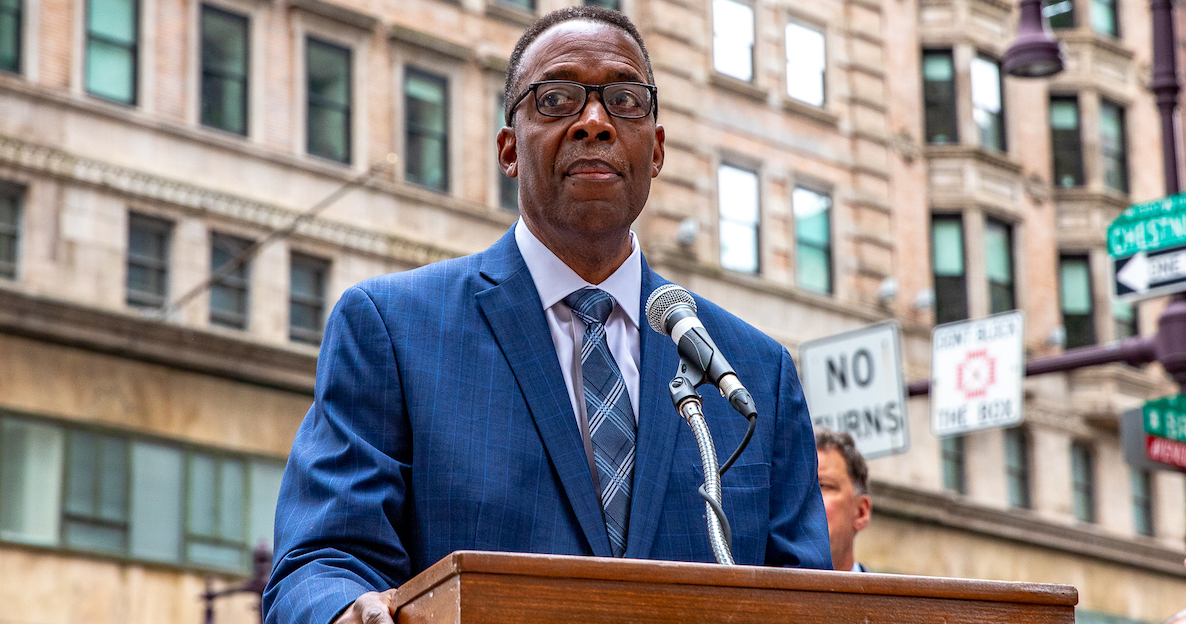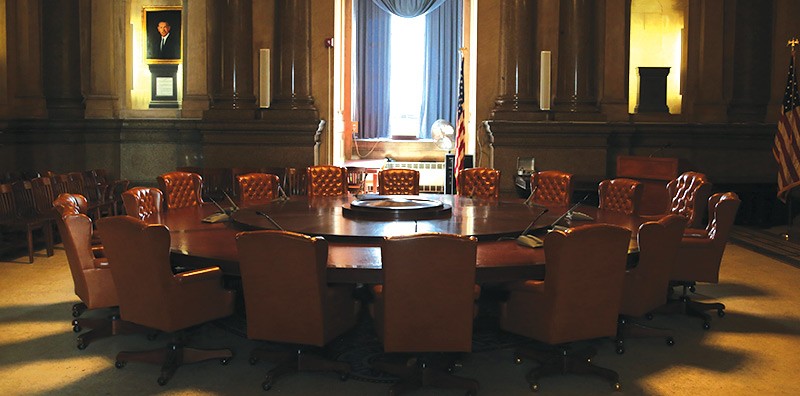Max Marin has an important piece up at Billy Penn on why it’s so hard for anyone to run against sitting District Council incumbents under the current system, leaving Philadelphia with one of the oldest, most entrenched local legislatures of any large U.S. city.
Readers might come away feeling like change is hopeless, but it’s largely the result of a policy problem that’s been solved in other places, most notably in New York City Council, with term limits, public financing, and some other campaign finance changes that are actually already under discussion here.
Here’s the basic outline of the problem, from the article:
Public housing resident Sheila Armstrong knows she’ll need to do some serious fundraising for her campaign against Council President Darrell Clarke.
But as the single mother sets out to court donors, she’s run into a problem. People are terrified to give her money because of who she’s running against. Even the act of trying to raise money has built-in resistance, Armstrong discovered. Convincing a local venue to rent her space for a fundraiser was a struggle, she said, because the business owner worried about political retribution […]
Some potential donors fear backlash could hurt their business interests. District councilmembers hold a vice-grip on development in their neighborhoods under a contentious tradition better known as councilmanic prerogative.
“Councilmanic prerogative strikes fear into the hearts of a lot of people,” said candidate Lauren Vidas, who’s challenging District 2 Councilman Kenyatta Johnson in the May primary. “I have a conversation 10 times a day that’s like, ‘You’re great, I’d love to support you, but I can’t be on your campaign finance report.’”
![]()
There are some recent examples of insurgent challengers ousting long-time incumbents in other local offices in spite of this dynamic, like in 2017 when Rebecca Rhynhart bested four-term Controller Alan Butkovitz in the Democratic primary. But there hasn’t been a recent example to point to in a City Council District, which only strengthens the mythology that it’s impossible to defeat District incumbents.
Right now the statistics look pretty discouraging. Consider:
- Since 2003, the 7th and 8th Districts have been the only two competitive districts; 6 of the 11 total semi-competitive races were in those two districts
- In the 80 District Council races since 2003, 11 have been decided by 20 points or less
- Only 8 were truly competitive races (decided by less than 10 points)
Term limits would change the game by forcing more turnover on a regular basis, so there’s no way to hoard your way to 11-terms on Council like Brian O’Neill in the 10th District. In New York City, they started with two terms per Council member, and then got bumped up to three terms during the deal Council struck with then-Mayor Michael Bloomberg to allow the second-term incumbent to run for a third term.
That, combined with a small-dollar match public financing system, which provides up to $2,000 in public matching funds per campaign contributor, has resulted in a city legislature that commentator Aaron Naparstek recently described as “a relatively youthful, dynamic and progressive legislature” with a 37-year-old Council Speaker Corey Johnson.
There are some recent examples of insurgent challengers ousting long-time incumbents, like in 2017 when Rebecca Rhynhart bested four-term Controller Alan Butkovitz. But there hasn’t been a recent example to point to in a City Council District, which only strengthens the mythology that it’s impossible to defeat District incumbents.
While New York still has a pretty durable political machine similar to Philadelphia’s, and it’s not like machine-backed candidates never win elections anymore, term limits still changes the dynamic described in Marin’s article by creating more open-seat races on a regular and predictable timetable. Rather than running against an incumbent, challengers can simply wait until the next open seat race. Running against an out-going elected official’s staffer or another elected official like a state representative would be difficult in many of the same ways, in terms of peeling off institutional support from a next-in-line candidate favored by the machine.
![]()
But we’ve seen upstart candidates surmount this challenge in the recent past here in Philadelphia, like when State Rep. Chris Rabb beat outgoing Rep. Cherelle Parker’s chief-of-staff Tonyelle Cook-Artis in the 200th District, or more recently Elizabeth Fiedler beat the party-backed candidate, 39th Ward leader J.R. Rowan, in the primary to replace retiring Rep. Bill Keller. It’s still a challenge, but it’s much easier when an incumbent isn’t on the ballot. The way things work now, lawmakers usually love retiring (or getting indicted) mid-way through the term, seemingly taking great care never to leave open seat opportunities like this. Term limits would ensure they happen on a regular timetable where challengers also have more time to spend preparing in anticipation of a run.
With some form of public financing program in place, such as Council member Derek Green has proposed, candidates with less institutional support would have an easier time raising money from outside the extended party network that, as Marin describes, is currently so efficient at shutting down potential challenges.
At most challengers can raise two years’ worth of funds, compared to the incumbent who can theoretically get some deep-pocketed contributors to donate the maximum amount each of the four years of their term. It adds up to an unfair head start for incumbents.
The other important change in Green’s bill that would also have an impact on competitive elections is the move from annual contribution limits to election cycle limits. The way it works currently, campaign contributors and political action committees can donate set amounts to Council members every single year, rather than having a cap for the whole 4-year election cycle. If Green’s bill does move Council to cycle limits, the cap will almost assuredly be lower than four times the current annual limits. And that translates into less off-year fundraising potential for incumbents, putting challengers on a more equal footing.
Think about it: challengers don’t start running a full four years in advance of the election—they typically get in after the November general election of the year prior to the election they’re running in. At most they can raise two years’ worth of funds, compared to the incumbent who can theoretically get some deep-pocketed contributors to donate the maximum amount each of the four years of their term. It adds up to an unfair head start for incumbents, which could be greatly reduced depending on the caps Council sets.
Which brings us to the practical problem for all these ideas: they require a City Council vote to pass. But while you wouldn’t generally want to bet on politicians voting to limit their own power, there are some possible creative bargains that could be struck to get to a deal on term limits, like exempting the current incumbents and only applying the limits to newly-elected Council members, or pairing term limits with an end to “resign to run,” which Council members all hate. There are plenty of possible ways to get there, and an unusually competitive Council election year is a great time to start the conversation.
Jon Geeting is the director of engagement at Philadelphia 3.0, a political action committee that supports efforts to reform and modernize City Hall. This is part of a series of articles running in both The Citizen and 3.0’s blog.












